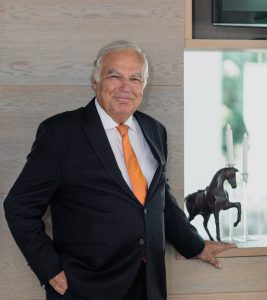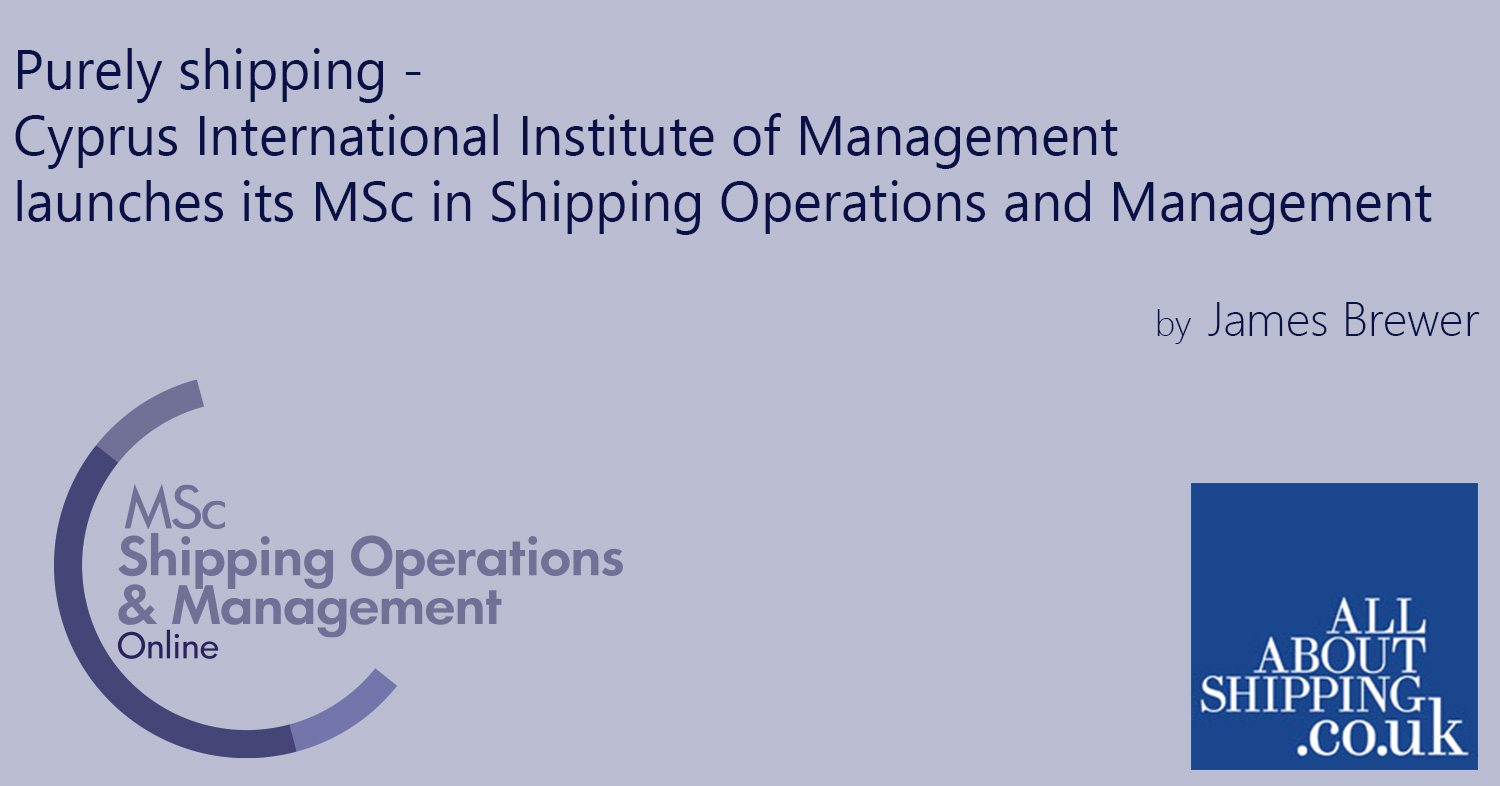Purely shipping – Cyprus International Institute of Management launches its MSc in Shipping Operations and Management
by James Brewer
From Allaboutshipping.co.uk. Click here to view original article
A new educational programme, sharply focused on the shipping industry and designed for managers and other qualified employees in the sector, as well as graduates and professionals from other fields who aspire to a shipping career, will make its debut in January 2021.
Cyprus International Institute of Management is introducing its MSc in Shipping Operations & Management devoted exclusively to the industry and covering a huge range of elements within the maritime ecosystem – from the basics indicated by its title, to business strategy and finance and the role of data analytics and artificial intelligence in enhancing performance.

CIIM Director & Dean Dr. Theo Panayotou
Professor Theodore Panayotou, the Director and Dean of CIIM, said that students, who will be men and women based ashore or at sea, will benefit substantially from the institute’s close and growing ties with ship management, ship registry and other services for which the Republic of Cyprus is noted, and the institute’s links with entities worldwide.
A quick glance at the internet will yield details of a good many programmes on international shipping, but Dr Panayotou identifies the new programme as benefiting from a distinct approach.
“This programme provides focused shipping education as required by the market,” he insists.
“Our programme is designed ab initio as a postgraduate programme in Shipping Operations & Management with 100% of its courses and coursework devoted exclusively to the shipping and maritime sector.
“Furthermore, in developing the programme we involved and consulted extensively the shipping industry and a sample of individual shipping companies which was instrumental in the programme’s design.”
Many of the shipping management programmes offered by other business schools are in fact not dedicated shipping programmes but tend to mix shipping-related instruction with general business, finance, or other aspects, to economise on resources.
CIIM’s offering also holds out a clearly separate perspective from, for instance, private company-organised programmes.
“Our programme is not a competitor or substitute for company in-house training programmes; hence, they are not comparable,” said Dr Panayotou. “Company programmes involve professional training on technical and practical issues in the day-to-day operation and management of ships, ports and logistics. Our programme is an academic qualification employing state-of-the-art theory and practice to take shipping operations and management to a new level.”
He cites the programme’s planned tuition sessions on shipping operations, performance optimisation and analytics. These will show “how the use of machine-learning, artificial intelligence and data analytics can help in optimising operational performance and realise huge savings in energy and other costs, increasing competitiveness and boosting the profitability of shipping companies, while lowering emissions at the same time.”
The programme was planned specifically for virtual-learning, well before the outbreak of the pandemic obliged educators more widely to turn to virtual tutoring. The format was decided in recognition of the nature of its target industry and the constant mobility it demands of its operations and participants.
“Since a good part of our target audience is at sea, only through an online platform can such people access our programme,” said the CIIM director. “Even land-based managers and executives would be hard-pressed to meet the inflexible schedule of face-to-face attendance. As for international students, online programmes are always easier to access without quitting their jobs and incurring the inconvenience and cost of relocation. “
How will students be helped to keep up to date with the impact of dramatic developments, at present for instance the pandemic’s disruption of markets, crew change practice and much else; and high-tech, AI, automation of ships and remote systems, that are rapidly reshaping the industry?
“The shipping industry is expected to navigate through many twists and turns of different situations like upcoming regulations, climate change, energy shortages and technological revolutions, not to mention the totally unpredictable effects of the pandemic,” remarked Dr Panayotou.
“Students in the new MSc will be helped to keep up to date with the impact of dramatic developments that are reshaping the shipping industry by a) the constantly updated content of our courses, b) the engagement of our instructors who are in the forefront of these developments, c) the engagement of students in cutting-edge research in the area, and d) our participation in international academic and industry conferences.”
An advantage of face-to-face lectures and classes is that students get to know each other and make excellent contacts for their ongoing career; so does the CIIM programme offer any mechanism for the student body to benefit from the best aspects of traditional college culture?
Dr Panayotou’s view is: “Of course, there are advantages to traditional face-to-face delivery, such as interaction and socialisation among the students, which we try to replicate online, to the extent possible through live lectures, group work, live simulations, Q&A sessions and virtual interaction. CIIM has put in place mechanisms, from online chatrooms to virtual socialisation, through which students get to know each other and start networking. Once the pandemic is over, we plan face-to-face events and visits to shipping companies in Cyprus and Greece and beyond.”
CIIM representatives are working on cementing relationships with predominant and specialist organisations in the shipping industry.
“Starting with our home base we have been cultivating a close relationship with the Cyprus Shipping Chamber and Youngship Cyprus, a branch of YoungShip International, a professional non-profit organisation for young people,” said the CIIM leader. “We also have close relationships with most of the shipping management companies in Cyprus. The Cyprus Registry is classified as the 10th largest merchant fleet globally and the third largest fleet in the European Union with more than 1,000 ocean-going vessels totalling 21 million gross tons.
“Limassol is a major global shipmanagement centre. We further maintain connections with the shipping industry in Greece and Singapore, among the largest globally.
“We are strengthening further these relationships through participation in conferences as well as engagement of shipping executives as research collaborators, instructors and practitioners in our programme.”
The programme is scheduled to start on 11 January 2021 with a cohort of 30 students. “We opt for smaller classes to maximise online class participation and individual engagement. It takes 15 months to complete the programme, which is divided into three semesters, each running for 18 weeks. During each semester three of the programme’s nine courses are taught through three hours of live sessions, on average, per week. The programme will have at least two student intakes a year, in January and in September.
With its purely shipping-related mandate, the programme is designed to meet the needs of the industry and the requirements of employers. Many employees in shipping may not have had the opportunity to receive specialised shipping education or may require postgraduate shipping education to enhance their career prospects, including for example seafarers embarking on a career ashore.
Key topics in the programme include maritime economics, international trade and shipping, and specialised shipping markets; crew management, leadership, team building, training, retention and seafarer performance management; charter markets, chartering practice and charterparty analysis; legal and insurance issues; port economics and logistics; financing and risk management including shipping derivatives; and environmental protection and safety.
Some people joining the programme may be crossing over from various disciplines including business administration, law, economics, the social sciences, mathematics, and engineering.
Those who will graduate from the MSc programme are said to have great potential for local and international careers in shipping and maritime logistics. Cyprus-based participants may be looking for employment in the many shipping and ship management businesses with headquarters or branches in the republic: companies with a reputation as being among the best employers on the island.
Greece-based participants will be well placed to seek work in the number one shipowning nation by volume and fleet value, in addition to the option of pursuing an international career.
By its nature, the virtual-learning degree opens valuable opportunities for participants from elsewhere in Europe and from Middle Eastern countries and India, China, and other Asian markets.
Prof Panayotou, Director and Dean of Cyprus International Institute of Management, is Professor of economics, entrepreneurship and ethics at the institute. He has served as advisor to businesses, international organisations and governments around the world, most recently as a member of the Cyprus President’s Council of the National Economy. During his career, he taught economics for 23 years at Harvard University. In 2007, he was recognised for his contribution to the work of the Intergovernmental Panel on Climate Change (IPCC) which won the 2007 Nobel Peace Prize.
The programme director, Dr Antonis Violaris, has wide experience of initiating and managing investments in shipping, and in analysing the shipping, oil and energy, and foreign exchange markets.
Dr Demos Petropoulos is co-director and shipping industry advisor to the programme. He has extensive professional experience in the financing of the shipping industry, and has been instrumental in several successful projects in the sector.
Resident faculty comprises Dr Stelios N Markoulis, an associate professor of finance and shipping finance at CIIM who has long experience as a member of the visiting faculty at the University of Cyprus, CIIM, and the Open University; Dr Yiannis Filippopoulos, an assistant professor of shipping operations and analytics at CIIM, who is an information systems and digital transformation specialist with interests include the Internet of Things, big data, artificial intelligence and blockchain platforms; and Dr Vicky Katsioloudes, an assistant professor of leadership and human resources management at CIIM.
Special teaching personnel include Dr Li Sheng who has established two shipping-related companies of which he is president: HIT Marine in Shanghai, and Mainland Shipping (Singapore) Pte. He has worked in shipping and shipbuilding industries for 35 years. Dr Andreas Frangos is with SCF Management Services (Cyprus), part of the Russian government’s SCF Group. Dr Anna Cheimonidou teaches company law at the University of Essex and focuses on the law governing insurance contracts.
Applicants are interviewed online within 48 hours from applying and are informed of the result in the following 24 hours. Requirements include a Bachelor’s degree from an accredited programme and documented proficiency in the English language.
With campuses at Limassol and Nicosia, Cyprus International Institute of Management was established in 1990 by far-sighted business leaders and renowned academics from some of the world’s top business schools. A non-profit organisation, all its programmes are accredited by the Cyprus Agency of Quality Assurance and Accreditation in Higher Education (DI.P.A.E.), in accordance with the standards and guidelines of the European Network for Quality Assurance (ENQA). It is recognised by KYSATS, the competent authority of the Republic of Cyprus for higher education qualifications.
For more information, please see https://www.ciim.ac.cy/msc-shipping-operations-management/


